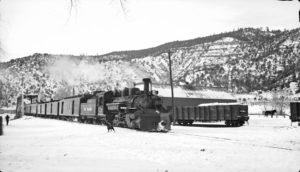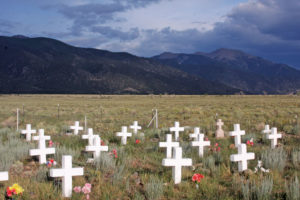By George Sibley
I sometimes sort of joke, in these pages and elsewhere, about the 21st century, wondering in 2016 if we will ever get to the 21st century, and what it will be like if we do.
I do argue – seriously, not jokingly – that “a new century” will not really begin until we actually start doing a lot of constructive work (not just “regulatory”) to address the challenges we began to bicker about in the late 20th century. The calendar notwithstanding, we are still carrying forward the tired old debates about climate change challenges, infrastructure needs, energy transition and ever-growing economic inequality in an America where truly we are not all created equal in any meaningful sense of the term. The presidential campaign thus far indicates that we are still stuck in the 20th century: climate change might not be real, and even if it is, doing anything about it would be bad for business and jobs; the infrastructure needs would require government investment we cannot afford and still serve our billionaires, and would also through convoluted logic be bad for business and jobs; the energy transition would do disservice to the oil and gas industry, and would be bad for business and jobs, etc. The 21st century to this point still feels like the late 20th century.
I do have to look at my own somewhat passive complicity in all this, however. I write a good game about what we ought to be doing, but as has been so often noted: when all is said and done, more has been said than done. I am not out marching in the streets for or against anything I believe in; I keep thinking about rooftop solar, but we are not sure how much longer we can stay in this slightly too large house; I ride my bike almost everywhere when the sun shines but still drive if it is raining (or looking like it); we use the woodstove enough to significantly reduce our gas consumption, but I doubt there’s much net gain after figuring in the wood-gathering expenses, etc. So when am I going to move on to the 21st century? What happened to the energy and enthusiasm I felt for the future back in the 1960s and early 70s?
A hypothesis I would tentatively pose for this personal but also somewhat global ennui would be that we have not really faced up to how exhausting the 20th century really was. Exhausting in two ways: never has the human species brought about so much almost miraculous technological and political change on itself in such a short period; and never has the human species been so viciously hard on itself for such a long period.
I became more aware of this recently with an epic reading jag: I finally got around to Ken Follett’s “Century Trilogy,” a 3,000-page set of three historical novels covering the period from the run-up to the first World War (1914-18) to the fall of the Berlin Wall and collapse of the monolithic Communist imperium (1988-89). Fall of Giants (2010), Winter of the World (2012), and Edge of Eternity (2014) are the three volumes.
Follett built his reputation as a writer of thrillers on spy-and-conspiracy themes, not a genre I much care for, but it was obvious from the first chapters of Fall of Giants that Follett was launched on a much larger and more serious venture. “Historical fiction” is a genre that tells the individual stories of people whose lives are being impacted by historical events to some degree, running a spectrum from history as mere backdrop to individual stories, to stories of invented individuals being actively and intimately connected with the unfolding of the historical events. Follett’s trilogy tends toward the latter; he creates a bevy of mostly believable characters that, for one logical reason or another, are actively involved in some way in practically everything of importance that happened in the 20th century (1910 to 1990).
He achieves this through four generations of five families: a Welsh working-class family (his own roots), an English aristocratic family, an upper-class German family, an upper-class American family, and two Russian peasant brothers, one of whom stays in Russia and raises a family along with a political and economic revolution, while the other immigrates to America and raises a family (along with a lot of illegal hellraising). These five families interact in many ways through the three books: sometimes entirely “naturally,” as when the English Earl falls in lust for the lovely Welsh coal-miner’s daughter who has entered service in his manor; and sometimes in ways that strain the reader’s credulity a little, as when the daughter of a Russian immigrant marries the son of an American gangster, and their daughter marries the illegitimate son of the English Earl and the coal-miner’s daughter.
So coincidences abound, but what they all ultimately illustrate, often dramatically, is the grinding wear and tear on human lives of the western world’s wrenching break from the class-based inequity of czarist Russia, Prussian Germany, over-reaching royalist Great Britain and Gilded-Age racist America, and the replacement of those outmoded models with – well, with systems still being worked out, worked over or plowed under by new ideas, and therein lies the ongoing human trauma and drama.
In the course of the three volumes, we have intimate looks at practically every seminal event of the 20th century. We are eavesdropping in the halls of power as good men try to avoid the Great War and stupid men successfully launch it – then in the trenches with troops thrown into 19th-century battle strategies against 20th-century weaponry. (The 4,000 or so American soldiers lost in Iraq since 2003 would be one morning’s tally in World War I.) We join starving Russian peasants in the mob-storming of the Czar’s Winter Palace, then see individual hopes exhausted as the fumbling efforts toward the “workers’ paradise” require “disciplining” measures that gradually harden into Stalinist policies more cruel and chaotic than the Czar’s. We are in the streets of Berlin (waiting in line for bread) as Hitler’s brownshirts spread fear and chaos – then more waiting for bread between Allied bombings – then hiding in fear as the Red Army “liberates” the city with a mass ritual of rape – then seeing the East German Stasi take over from the Gestapo, same tactics, same reign of fear (and same lines for food). Back in the U.S., we ride the Freedom buses into Dixie violence as vicious as anything fostered by Hitler or Stalin; we are up close and personal with the creation of the atomic bomb, and the assassinations of a president, his brother and a civil rights leader – who we’ve also heard deliver a great sermon to the nation from the Capitol Mall. We join Follett’s characters glued to the televisions as the Cuban missile crisis is slowly and carefully defused. And on and on, back and forth between the U.S., England, Germany and Russia. The research required a small army of assistants and consultants, not just into the history of events but into the daily lives of peoples either lifted or steamrolled by the events.
This is all written in a fast-moving and vivid style – it’s a page-turner, but it will still take you a while. And I recommend the ebook versions; the 1,000-page books are dangerously heavy for reading in bed at night.
I do have a couple criticisms. His characters are often a little flat at times – the good people are very, very good, and the bad people are very, very bad; one suspects that most of them might have had a little more of the “mixed elements” most of us find in ourselves.
There is also not much about what we could actually celebrate about the 20th century: the social and economic gains of the 1930s in America, the technological advances that put everyone in the air, nuclear energy in power grids, and a man on the moon – these things are not part of Follett’s story. There is no mention of the “Great Awakening” that began in the 1960s and 70s as the nations woke up to the damage being done to the planet and began to commence to proceed to address that damage.
But in the overall, it is an impressive piece of work; and taken in one large dose like this trilogy, it may not be an excuse, but it is a reason why the western world seems to be sunk in ennui in the face of looming problems – many of which are but consequences of 20th-century efforts to solve other problems. To paraphrase Churchill, never have so many experienced so much at the hands of the few, with such ambiguous results – and come away with more good reasons to be skeptical of new calls to action.
George Sibley reads and writes and loafs to invite his soul in Gunnison.



